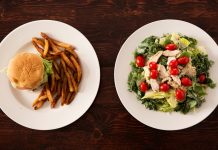It’s the time of the year when, for many of us, excesses don’t seem to matter too much—fruit mince pies, chocolate truffles, and more cake than the number of baubles on your Christmas tree!
You find yourself going from one Christmas party to the next, which then somehow morphs into end-of-the-year celebrations and before you know it, it’s the new year and you’re left feeling sluggish, overweight, and nursing a horrible feeling of guilt.
The end of the year is a great time to relax from the stresses of the past year and reflect on its highlights as you wait in anticipation of a better year ahead. So start the new year right by ending the previous year on a happy, healthy note.
Go vego
Look for healthy options at the table. Avoid meat, especially the processed kinds such as salami, sausages, ham, and bacon. These are loaded with salt and as much as 50 per cent of their fat is saturated! If you’re in doubt about a particular dish, simply choose from a variety of salads, vegetables, beans and fruit—the basis of a plant-based diet—and eat them whole or raw. Plant foods contain phytonutrients such as flavonoids, carotenoids and resveratrol, all of which are health-enhancing chemicals. A plant-based diet offers significant protection against coronary heart disease, strokes, and cancers of the bowel and rectum.
Make sure you’re hydrated
We often mistake thirst for hunger, so when you feel like you need to eat something, take a drink of water first. Our bodies depend on water to function properly. Also, because soft drinks are full of sugar, this holiday season try to minimise the number you drink. And avoid alcohol altogether. Whether it’s beer, wine, or premixed drinks, alcohol causes liver damage, brain damage (especially in teenagers) and cancer of the pharynx, larynx, oesophagus, the bowel in men, and breasts in women.
You can opt for non-alcoholic wine or dark grape juice, but even these should not replace your water. A helpful daily guide is to drink 30 millilitres of water for every kilogram of body weight. For example, a 70-kilogram person needs to drink 2.1 litres of water a day.
Make healthy alternatives
A cheesecake without the saturated fat trappings of the cream and cheese? A chocolate pudding without the use of artery-clogging margarine or butter? What about a Christmas cake without copious amounts of sickly sweet sugar? All these are possible and readily available today, thanks to a growing interest in healthy food. A raw “cheesecake” can be made with cashews, increasing your use of heart-protective nuts. A fruitcake can be sweetened with fresh fruit juice, reducing your consumption of processed sugar that is kilojoule-laden. The sticky, gooey texture of pudding can be created with chia seeds, which happen to be loaded with fibre, omega-3, protein, and many great minerals and antioxidants.
Buy healthy
When you’re home during the holiday season or when you have friends visiting, it’s inevitable that you’ll reach for some form of snacks. Just as there are healthy—and tasty—dessert alternatives, so there are also healthy snacks that you can buy to store in your pantry, such as nuts, seeds, and dried fruit. Try lightly drizzling maple syrup over raw nuts, sprinkling salt on them, and roasting them.
Another healthy alternative is to make your own kale chips. These are a great replacement for commercially produced snacks, and are low in those rapidly digested carbohydrates and unhealthy fats that make it far too easy to gain weight, and keep it on.
You can also make your own sweet snacks using dried fruit or simple wholefood ingredients, thus avoiding high levels of saturated and trans fat.
Hara hachi bu
You may not know what hara hachi bu means, but it’s a very familiar term to the long-living Okinawans from Japan as they sit down to enjoy a meal—and it can serve well as your mantra over the festive season. Hara hachi bu means, “Stop eating when your stomach is 80 per cent full.” Our brains tend to work 10 to 20 minutes behind our stomachs, so by the time you actually feel full, you’ve gone too far. Have you ever had that too-full feeling after a meal? That’s because you’re eating till you’re 100 per cent full. But if you stop when you’re 80 per cent full, chances are that you’ll feel just right in about 20 minutes.
Keep moving
You don’t have to maintain your full workout schedule or even your usual exercises over the holiday period, but make sure you engage in some form of activity and try to make it daily. Maintaining your physical fitness improves your heart health, helps control your blood sugar levels and bone density, and will decrease your risk of lifestyle cancers. You’ll also sleep better, feel better, and have extra energy to deal with the increased number of activities that come with the end of the year. Mix up your exercise: a walk with the family; an intensive game of squash; or take a trip to the beach to jump in the waves, body surf, or play a game of cricket.
Indulge… in moderation
You can not only have that extra candy cane; you can also savour it without feeling racked with guilt from eating it. The same goes for that extra serving at dinner. It will make the experience all the better if you’re not feeling regretful the second the spoon touches your lips. But don’t make indulging a habit—it might be time to take a break if you’ve already had five candy canes in a row or have been going for that extra helping at mealtime for the last three parties you’ve attended.
A little indulgence is fine; a lack of restraint, on the other hand, results in extra centimetres around your waist. To put it into perspective, that extra slice of Christmas cake will take 40 minutes of walking to burn off the kilojoules you gained from it.
Keep the above tips in mind as you launch into the many end-of-year celebrations. The Christmas season is a time to enjoy with your loved ones and to contemplate the wonder of Jesus, so don’t mar it with regrets of what you should or should not have eaten.
This article first appeared on Signs of the Times Australia




















